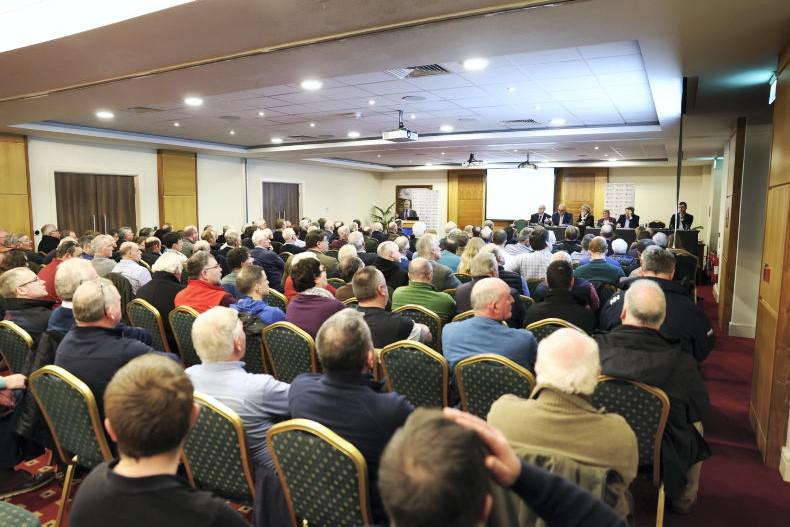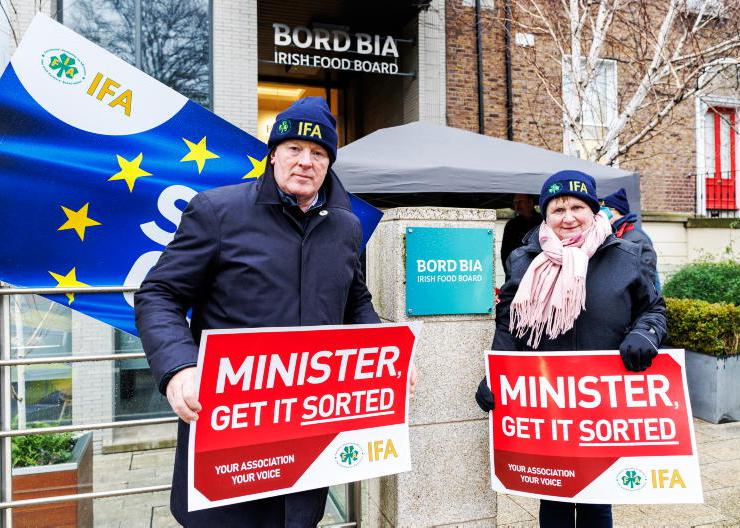The Department of Agriculture is to develop a voluntary rewetting scheme for farmers to rewet their land, Bill Callanan of the Department of Agriculture has said.
The chief inspector with responsibility for provision of scientific advice on agriculture and the environment told an IFA meeting on peat soils in the Hodson Bay Hotel in Athlone on Thursday night that under the Nature Restoration Law farmers will not be forced to rewet their land.
He outlined that the rewetting of State land will satisfy the targets under the law and farmers will be incentivised to rewet land voluntarily.
“The responsibility is on the State, not on the individual farmer and I want to be very clear on that. The commitments are at State, not farm, level,” he said.
Callanan reiterated this point several times during the course of the meeting, which discussed the Nature Restoration Law, the new GAEC 2 rules and Climate Action Plan targets and their impacts on farmers on peat soils.
It will be mostly Bord na Móna land that will satisfy Ireland’s rewetting obligations, he said.
“The State lands do deliver what those targets are right out to 2050. But there will be voluntary opportunities for farmers to contribute to the targets, but it has to make sense for them. It has to be financially viable and fit into their systems.
“If you look at a carbon-constrained world into the future, we will need land which you own to have multiple objectives,” he said.
Food has to be a primary objective, he said, but there “will be opportunity for energy production, biomass and the creation of bioeconomy. This will include carbon farming.
“The Nature Restoration Law does have targets on drained organic soils – the law provides that harvested peatlands can be used. There will be an opportunity for farmers and we will design appropriate schemes and supports for additional actions.
“CAP payments will not be impacted if you’re engaging on any of the proposed actions,” he commented.
He later added at the meeting: “I think I said voluntary enough times. Voluntary is voluntary.”
Farmers at the meeting however argued that even if they did not choose to rewet their land, parts of their land could still be rewet if a neighbouring farmer decided to rewet their land under any new scheme.

IFA director of policy Tadhg Buckley addresses the meeting in Athlone. \ Philip Doyle
Closed-meeting
The Department official refused to apologise for the closed-door meeting hosted in Portlaoise in recent weeks, which farmers were not invited to attend, where rewetting targets and getting farmer buy-in was discussed.
“I won’t apologise for that,” Callanan said, adding that once a decision made on policy, it is the Department’s job to implement it.
“The second is in making that decision, to bring forward to proposals. That meeting was simply around the Department trying to build-out what we should be doing and what we should bring forward to the minister,” he told farmers in Athlone.
He said the purpose of the meeting was to put down on paper what the Department is trying to do and what any voluntary scheme should look like.
There will be engagement with farm organisations on the scheme, he went on to say.
Top-down approach
IFA deputy president Alice Doyle said that measures cannot be imposed in a top-down manner on farmers.
“Farmers need to be fully informed. It’s not good enough that farmers are hearing what’s happening to their farms in the media,” she said.
She said that the new GAEC 2 rules, Nature Restoration Law and Climate Action Plan are causing fear, anxiety and uncertainty among farmers.
“The clear message here tonight is that farmers want to farm their land in environmentally-friendly way but, most of all, they need a viable income,” she said.
For more, see www.farmersjournal.ie over the coming days and pick up next week’s Irish Farmers Journal.
The Department of Agriculture is to develop a voluntary rewetting scheme for farmers to rewet their land, Bill Callanan of the Department of Agriculture has said.
The chief inspector with responsibility for provision of scientific advice on agriculture and the environment told an IFA meeting on peat soils in the Hodson Bay Hotel in Athlone on Thursday night that under the Nature Restoration Law farmers will not be forced to rewet their land.
He outlined that the rewetting of State land will satisfy the targets under the law and farmers will be incentivised to rewet land voluntarily.
“The responsibility is on the State, not on the individual farmer and I want to be very clear on that. The commitments are at State, not farm, level,” he said.
Callanan reiterated this point several times during the course of the meeting, which discussed the Nature Restoration Law, the new GAEC 2 rules and Climate Action Plan targets and their impacts on farmers on peat soils.
It will be mostly Bord na Móna land that will satisfy Ireland’s rewetting obligations, he said.
“The State lands do deliver what those targets are right out to 2050. But there will be voluntary opportunities for farmers to contribute to the targets, but it has to make sense for them. It has to be financially viable and fit into their systems.
“If you look at a carbon-constrained world into the future, we will need land which you own to have multiple objectives,” he said.
Food has to be a primary objective, he said, but there “will be opportunity for energy production, biomass and the creation of bioeconomy. This will include carbon farming.
“The Nature Restoration Law does have targets on drained organic soils – the law provides that harvested peatlands can be used. There will be an opportunity for farmers and we will design appropriate schemes and supports for additional actions.
“CAP payments will not be impacted if you’re engaging on any of the proposed actions,” he commented.
He later added at the meeting: “I think I said voluntary enough times. Voluntary is voluntary.”
Farmers at the meeting however argued that even if they did not choose to rewet their land, parts of their land could still be rewet if a neighbouring farmer decided to rewet their land under any new scheme.

IFA director of policy Tadhg Buckley addresses the meeting in Athlone. \ Philip Doyle
Closed-meeting
The Department official refused to apologise for the closed-door meeting hosted in Portlaoise in recent weeks, which farmers were not invited to attend, where rewetting targets and getting farmer buy-in was discussed.
“I won’t apologise for that,” Callanan said, adding that once a decision made on policy, it is the Department’s job to implement it.
“The second is in making that decision, to bring forward to proposals. That meeting was simply around the Department trying to build-out what we should be doing and what we should bring forward to the minister,” he told farmers in Athlone.
He said the purpose of the meeting was to put down on paper what the Department is trying to do and what any voluntary scheme should look like.
There will be engagement with farm organisations on the scheme, he went on to say.
Top-down approach
IFA deputy president Alice Doyle said that measures cannot be imposed in a top-down manner on farmers.
“Farmers need to be fully informed. It’s not good enough that farmers are hearing what’s happening to their farms in the media,” she said.
She said that the new GAEC 2 rules, Nature Restoration Law and Climate Action Plan are causing fear, anxiety and uncertainty among farmers.
“The clear message here tonight is that farmers want to farm their land in environmentally-friendly way but, most of all, they need a viable income,” she said.
For more, see www.farmersjournal.ie over the coming days and pick up next week’s Irish Farmers Journal.










SHARING OPTIONS